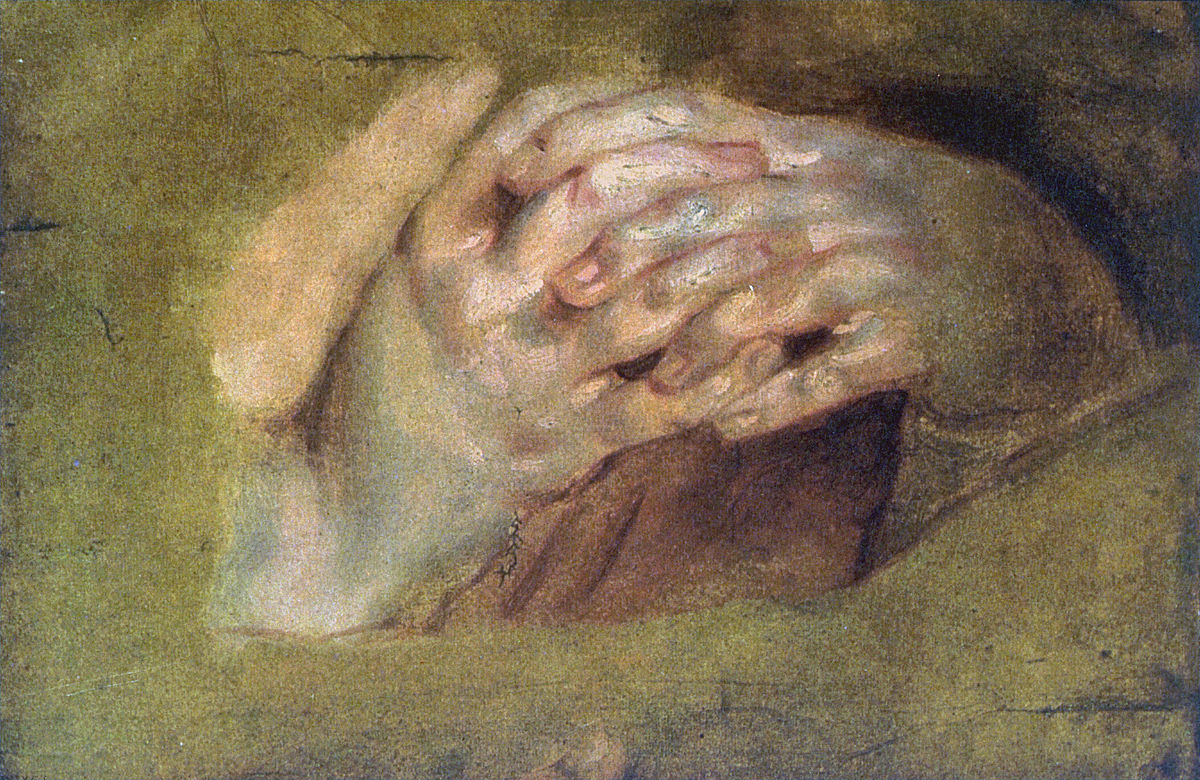Soon after Wendell Berry was married, his father mentioned to him: “Well, you got a good girl.” The younger Berry nodded along, “I know it.” To which the elder Berry blurted out, “Well you don’t deserve a damn bit of credit for it.”
Reflecting on this conversation, Berry notes, “You see, we don’t have enough sense to make these decisions. Somehow, you just get led to where you’re supposed to be, if you’re willing to submit.” I don’t like that last “s” word. Submit. No thanks.
Most people would describe me as “Type-A.” I like producing, being busy, checking things off a list. Plans are fun for me. I’ve never had a vision board, but in another life, I think I could have gotten into them. I like to influence the outcome. I like control. In other words, I don’t like submitting.
Berry’s advice challenges my penchant for control. He suggests that submission to his life, to his circumstance, to his marriage has led to happiness. He didn’t manufacture his life but lived into it. And as he reflects from near the end of his life’s pilgrimage, he realizes how much of its goodness lies outside of his control, how much comes as a gift.
Submitting in an Anxious Age
My main job is teaching college students. They are entering an exciting and anxiety-ridden time of their life. Their whole life, as it seems, is before them. Where to go to college? Who to marry? Grad school? Which one? What job to take? Where to move? What am I doing? Who am I? As I reflect back on my younger days, I know I didn’t have the wisdom or sense to know what to do at these crucial junctures. And neither do they. Their own ignorance effects these monumental and consequential decisions. They make choices that they’ll celebrate or regret for the rest of their lives. They have choices, and freedom to make choices, which leads to the excitement (and anxiety). What to do with so much freedom?
I have distinct memories of life post-college. I remember being young in my career and looking around at my closest friends. They seemed so… successful. They were at jobs they liked. I was at a church in which the life of the mind was seen as a threat or disadvantage. Others were doing meaningful and important ministry work. I was in seminary training for ministry. Those in ministry who had to raise funds made it look easy. Those who had jobs had enough money early in their careers to give funds to those in ministry. I was bartending at a slow restaurant in a yuppy town and scrapping for every penny. My friends were getting married. I didn’t even know who around me was worth marrying. I felt hopelessly lonely while others found companions. They had generational wealth that allowed them to buy houses and make a home. I was living with roommates in my apartment dealing with noisy neighbors at best—or deciding whether to call the police when the domestic dispute next door got too heated. Life seemed to be going so easy for them, and my life seemed like so much effort, so much work, so much empty striving. It wasn’t like I was lazy as much as I felt unlucky. Whatever my friends had, it seemed like life hadn’t passed that gift to me. Everything seemed to be an uphill climb with nothing coming easy, while I looked around at everyone else in cruise control. I was Sisyphus. I felt, in the poetic words of Bono, that I was running to stand still.
And in some ways, I felt like I was to blame. If life is about the freedom to make good decisions, well then, I must be bad at making decisions. If I had decided to attend this other school, I may have had more opportunities. If I had handled this relationship differently, maybe we’d be married. If I chose this path, perhaps I would be in a different life stage. Do you see how terrifying these decisions can seem? Freedom of choice can feel like St. Augustine’s wrestle with sin in his Confessions: “I was bound not by an iron imposed by anyone else but by the iron of my own choice. The enemy had a grip on my will and so made a chain for me to hold me a prisoner.” I was a prisoner to myself, a prisoner to my own choice. This is the freedom that modern culture celebrates. To me, it’s terrifying.
I’m not offering some pandering, Dr. Phil moral advice. I’m not suggesting four steps to a better life. Maybe you’re just better at choices than me. But here’s the Berry-ian secret that I’ve learned the hard way: My plans suck, and God’s plans are better. I’ve found that Christianity is a long training plan in dying to yourself, including what you think your best life is. Life is a tutelage in helplessness.
Perseverance and Letting Go
I recently took a class to Mepkin Abbey for a silent retreat. While there, I saw a book of letters from Thomas Merton to influential and noteworthy figures of his time. I flipped through and found a correspondence between Merton and Dorothy Day. Intrigued, as these are two figures I admire, I began reading. They talked about suffering, about pain, about being misunderstood, about praying for one another. Towards the end of one letter, Merton wrote the following:
Perseverance–yes, more and more one sees that it is the great thing. But there is a thing that must not be overlooked. Perseverance is not hanging on to some course which we have set our mind to, and refusing to let go. It is not even a matter of getting a bulldog grip on the faith and not letting the devil pry us loose from it–though many of the saints made it look that way. Really, there is something lacking in such a hope as that. Hope is a greater scandal than we think. I am coming to think that God loves and helps best those who are so beat and have so much nothing when they come to die that it is almost as if they had persevered in nothing but had gradually lost everything, piece by piece, until there was nothing left but God. Hence perseverance is not hanging on but letting go. That of course is terrible.
Terrible, indeed. It’s as if God batters you down so much that you have nothing else but Him, like dying is actually living, like losing your life is gaining your soul. I think I read that somewhere…
There’s a term in Ignatian spirituality called holy detachment. We are born with passionate desire. Yet to experience God, we must put to death selfish passion and self-centered desire, and it’s hard to discern which passions are good and right and which are wrong and destructive. Holy detachment invites us to only care about the things that help us love God and love neighbor. In all other things, we should be passionless, detached, in some ways indifferent to whole swaths of human existence. Desire isn’t to be rejected but discipled. This discipleship process requires a rejection of the self-directed and reactionary passions. In Holy Living, Rowan Williams puts it like this. “The holy person is one ‘free from passion’ because he or she is the person free from having their relations totally dictated by instinct, self-defense–reactivity, as we might say these days.” Letting go and letting God is one of the lamest sayings I’ve heard, so repeated and trite that it’s become cliche. But the funny thing about cliches is that they tend to point toward the truth.
I want to invite my eager and fearful students to imagine what it would be like if they stopped caring what other people thought of them. That might seem like a rude attitude; part of a life of love is caring about people and their feelings. But I want them to imagine what it would mean to stop trying to make good impressions, to walk away from an encounter and not play in their minds over and over how they came across, to not care about what your friends think of them. What jokes would they not make? What posts would they make (or not make) on social media? Would they care about social media at all? What do they refrain from doing so that their friends will still think they’re cool? Imagining what it would be like if they didn’t desperately care about what others thought of them brings home the gift of holy detachment.
Looking back on those days after college, seeing people succeed where I felt like I was a failure, much of my distress was caused by my sense that my life wasn’t measuring up to my plans for it. I wanted the ease of comfort, security, control. I didn’t want dependence. I didn’t want submission. I didn’t want to live into my limits. The pains, concerns, and conflicts were never part of my design. Suffering isn’t typically part of my five-year plan. There really is little consolation for the pure suck-i-ness of life at times.
And yet.
I can also look back on my life in gracious bewilderment. I would have never planned for my life to go the way it has. If you would have told high-school-me about my current life, I wouldn’t have believed you—not so much because it’s exactly what I wanted. Far from it. I have a doctorate and am an Anglican priest. I would have made fun of myself if you told me that in high school. What a nerd. But I also can’t describe the sheer joy I feel when I walk into a classroom of 18–22-year-olds. I’m not being modest when I say I’m not very impressive. There are much smarter people than me with PhDs who don’t have an academic post. I can’t explain the rest I experience when praying the liturgy with my church family. I thought I wanted kids, but no one could prepare me for the way my 3-year-old son tells me that he loves me, or my daughter squeals when I arrive home from work. I couldn’t concoct this delight. Call it luck or coincidence. I’ll call it providential grace.
And the proper response to grace is submission. I remember a time when I stopped questioning every guideline my parents made and surrendered that maybe they knew something more than me. My life went a lot more smoothly. Stanley Hauerwas once wrote, “In scripture, we see that God is taking disconnected elements of our lives and pulling them into a coherent story that means something.” And if I can see that in the story of God and I know that God calls me into his story, maybe my life doesn’t seem so trivial and meaningless. Maybe my pains and hurts mean something in the story of God—even if, like the great of faith, I do not experience what is promised.
I’ve found that in perplexing or challenging circumstances, “why?” is a boring question. We like why. The leadership guru Simon Sinek asks us to start with why. It’s a popular question. I’m not against finding your why. I just think it’s overrated. Particularly in suffering or pain, I’m not sure “why?” works. Often, I have no idea. I may never have any idea. And even if I did have an answer to “why,” I don’t think it would help. God may be doing a thousand things, and I may be aware of two of them (and I probably will get both of them wrong), but knowing “why” wouldn’t alter the suffering. What helps, instead, is the great scandal of having nothing left but God, and finding his presence sufficient.
I can’t change my life. And I’m not wise enough to change it for the better even if I wanted to. All that freedom of choice is put to rest with the reality of being alive. What I missed in my early days of striving was the giftedness of life, the pure abundance of existence. The way of blessing is not through self-actualization or a well-made plan but through self-abandonment and surrender.
I have a good life, and I don’t deserve a damn bit of credit for it. That of course is terrible. And beautiful.
Image credit: “Praying Hands” by Rubens via Wikimedia Commons







1 comment
Art Kusserow
Beautifully written and thank you. As an addictions therapist, one quickly becomes exposed to the 12 Step of AA, the first of which is “Admitted we were powerless over alcohol and that our lives had become unmanageable.” This is considered the first and most necessary step because, without it, nothing further in recovery is possible. While some may argue that the 12 Steps are “outdated” in their approach, they continue to provide a “way out” for many. And it is another example of the paradox of losing one’s life to find it.
Comments are closed.